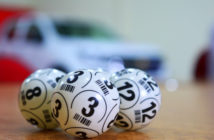Ask any person walking down the street for a number between one and ten, and there is a good chance that they will pick seven – but why do we place such significance on certain numbers?
Mathematician and author Alex Bellos recently ran a global poll to find out the world’s favourite number for a new book, Alex Through The Looking Glass, and found that “7” was the world’s most popular number, with more than ten percent of respondents choosing the number.
Many people have a special relationship with seven, seeing it as a number of cosmic significance, matching the number of planets in our solar system, or more locally the number of continents on the Earth or the seven colours in the rainbow. This is reflected in culture, where Snow White ran away with the seven Dwarfs, Shakespeare described the seven ages of man, and everyone’s favourite womanizing secret agent is 007.
Some are drawn to seven because it is a prime number, indivisible by any smaller, as Bellos noted:
“The fact that we can’t divide them cleanly makes them more distinctive. So when looking for a favourite number, that makes 3, 5 and 7 the most likely candidates.”
For others, the significance of seven is more personal, where one poll respondent instilled the number with human characteristics, explaining:
“Nice shape, simple line with vertical and horizontal interest…a number that is growing up. It’s a bit awkward; it can’t be equally divided and won’t bend to the rules so easily!”
Seventeen is also a popular lucky number for people, because it is again a prime number and contains the shape of the “7”. It is also in the middle of the roulette wheel, and so central to various gambling superstitions according to an interactive guide put together by Online Roulette.
However, 17 is not popular with everyone, and Italians see it as particularly unlucky. When viewed as the Roman numeral, XVII, it is then changed anagramtically to VIXI, which in Latin translates to “I have lived”, implying “my life is over.” In Italy, it is not uncommon to notice that buildings do not have 17th floor, hotels do not have a room 17, and the Italian airline Alitalia does not have a seat 17.
Seven may be generally considered the most popular number today, but that has not always been the case. The ancient Babylonians saw a special significance in 60, basing their mathematics and calendar around the number, which has resulted in the 60 seconds in a minute and 60 seconds in an hour that we use today, 4,000 years later.
Ancient Egyptians saw 12 as a significant number, where they believed in 12 realms of the dead, and that has resulted in the modern world having 12 months in the year and 12 inches in a foot, as well as there being 12 apostles in the Bible.




